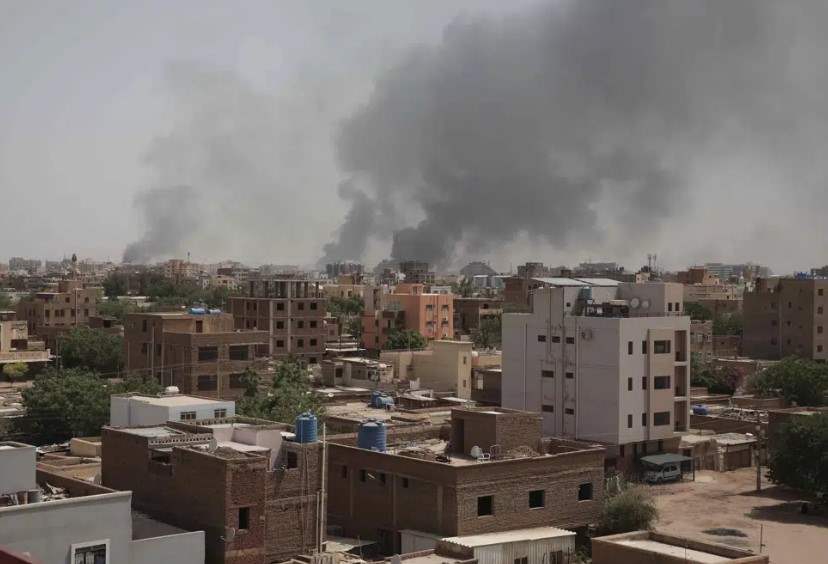Sudan’s rival commanders have agreed to a 24-hour ceasefire from Tuesday evening following pressure from U.S. Secretary of State Antony Blinken, as fighting has engulfed the capital Khartoum, and shots have been fired at a U.S. diplomatic convoy. The conflict between Sudan’s military leader and his deputy broke out four days ago, triggering what the United Nations has described as a humanitarian catastrophe, including the near collapse of the health system. The ceasefire was due to start at 6 p.m. (1600 GMT) and will not extend beyond the agreed 24 hours.
Army General Shams El Din Kabbashi, a member of Sudan’s ruling military council, said on al Arabiya TV that the ceasefire will not extend beyond the agreed 24 hours. Early on Tuesday, gunfire echoed across the capital Khartoum accompanied by the sound of warplanes and explosions. Residents in the neighboring cities of Omdurman and Bahri reported air strikes that shook buildings and anti-aircraft fire. Fighting also raged in the west of the country, the United Nations said.
The power struggle between General Abdel Fattah al-Burhan and General Mohamed Hamdan Dagalo, known as Hemedti, of the Rapid Support Forces (RSF), has derailed an internationally-backed plan to shift to civilian democratic rule after decades of autocracy and military control in Sudan. Unless controlled, the violence also risks drawing in actors from Sudan’s neighborhood who have backed different factions and could play into competition for regional influence between Russia and the United States.
The United States has expressed concern over the ongoing conflict and has appealed for a ceasefire. U.S. Secretary of State Antony Blinken spoke with both army chief General Abdel Fattah al-Burhan and paramilitary leader General Mohamed Hamdan Dagalo, known as Hemedti, of the RSF, appealing for the 24-hour ceasefire “to allow the Sudanese to be safely reunited with families” and to provide them with relief. Blinken said the U.S. convoy was attacked despite its vehicles being marked with diplomatic license plates and bearing U.S. flags. Initial reports suggest the attack was undertaken by RSF-associated forces.
Hemedti said the RSF approved the ceasefire to ensure the safe passage of civilians and the evacuation of the wounded. The RSF issued a statement saying it was waging a battle to restore “the rights of our people” in what it called a new revolution. Hemedti’s whereabouts have not been disclosed since the fighting began.
The situation in Sudan has taken a devastating toll on the country’s health system, with reports of attacks on health facilities and workers, leaving many in desperate need of medical assistance. The International Federation of Red Cross and Red Crescent Societies has warned that providing humanitarian services around the capital Khartoum has become nearly impossible, as fighting between rival factions has intensified.
The humanitarian crisis has also been exacerbated by the COVID-19 pandemic, with Sudan reporting a surge in cases in recent weeks. The country has struggled to obtain enough vaccines to inoculate its population, and the ongoing violence has further hindered efforts to control the spread of the virus.
The World Health Organization has called on all parties involved in the conflict to ensure unrestricted and safe access to health facilities for those in need of medical care. Director-General Tedros Adhanom Ghebreyesus emphasized the urgent need to prioritize the health and well-being of the Sudanese people, saying, “I want to be very clear: All parties must ensure unrestricted and safe access to health facilities for those injured and everyone in need of medical care.”
The situation in Sudan has drawn international attention and concern, with calls for an immediate end to the violence and a return to civilian democratic rule. The United Nations has described the conflict as a humanitarian catastrophe, with at least 185 people killed and much more injured or displaced.
The ongoing power struggle between Sudan’s military leader and his deputy has derailed efforts to establish a stable and democratic government in the country. It has also raised fears of further destabilization in the region, with the potential for neighboring countries to become involved in the conflict.
The United States has been among those urging an end to the violence, with Secretary of State Antony Blinken applying pressure on the rival commanders to agree to a 24-hour ceasefire. The ceasefire, which began on Tuesday evening, was intended to provide relief and safety for civilians caught in the conflict.
Image Credit: Marwan Ali/AP





